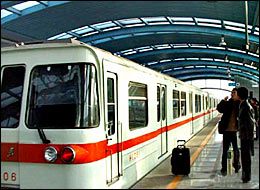
Central government has retained control over subway construction, despite decentralizing control of urban construction projects, due to the unusually high costs and low profits involved. As fares are kept low to ensure access, domestic equipment and new modes of investment are being used to increase economic viability.
The construction of each kilometer of subway now costs an average of 400-500 million yuan (US$48-60 million). The No.3 line in Guangzhou, 36 kilometers long and expected to go into operation in 2006, will cost 430 million yuan (US$52 million) per kilometer.
Hangzhou's subway, which recently got the green light to proceed from the State Council and expected to start construction next year, will cost 550 million yuan (US$66 million) per kilometer to build.
High building costs have made central government cautious in approving new subways – Hangzhou's is the first since the State Council suspended approval of subway construction in September 2003.
As large and medium-sized cities face up to increasing road traffic, subways offer a potentially effective way to ease congestion. About 140 million automobiles are expected to be on the roads by 2020, seven times more than last year.
About 200 billion yuan (US$24 billion) is being invested in subway construction during the 10th Five-Year Plan (2001-05).
Though bringing great public benefits, most subways in operation in China are losing money. The fares set by government are low, so money earned from them cannot cover construction costs and huge subsidies have been required.
In 2001, government subsidies for subway operations totaled 305 million yuan (US$37 million), about 200 million yuan (US$24 million) in 2002.
In the 1990s, the import of subway equipment raised overall costs to 600-800 yuan (US$72-97) per kilometer in Beijing, Shanghai and Guangzhou, higher than the average costs in many cities in the world.
In recent years, by using domestically made equipment, the cost per kilometer has come down; Guangzhou's subway saved nearly 4 million yuan (US$483,000) in 2003 by buying equipment made in China.
New investment and operational modes are also being considered to increase the economic viability of subway systems.
Early this year, Beijing's government and a Hong Kong subway company signed an agreement to jointly establish a firm to construct and manage the No.4 line. This public-private partnership (PPP) broke the monopoly in the capital's subway system and made the No.4 line the first PPP line in the country.
Hong Kong's subway is the most profitable in the world, netting several billion HK dollars (several hundred million US dollars) annually. Its experience could prove extremely valuable for Beijing, while the city government's financial burden has decreased considerably by having to fund only 70 percent of investment in the No.4 line.
(China.org.cn by Yuan Fang June 27, 2005)
|

